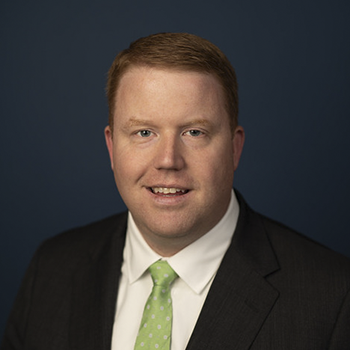Featured Member: John Dillard

Current employer:
OFW Law
Education and work experience:
University of Richmond (JD), Purdue University (MS – Agricultural Economics), Virginia Tech (BS – Animal and Poultry Science, Agricultural and Applied Economics)
AALA leadership roles:
I serve as co-chair of the awards committee and have previously served on the symposium planning committee.
How did you get interested or involved in agricultural law?
I’ve had a longstanding interest and involvement in agriculture. In high school and college, I took a keen interest in the role agriculture and food security plays into broader development. After working in industry for a while, I figured that being a lawyer with some background in food and agriculture would be interesting. This was a leap of faith – aside from my agricultural law professor, Leon Geyer, I had never met an attorney before I went to law school. During school, I did summer internships with NPPC and the American Farm Bureau Federation, which led me to OFW.
What is your current role and what type of work are you doing?
I lead OFW Law’s USDA regulatory practice. I primarily work with companies that are regulated by USDA’s Food Safety and Inspection Service, Packers and Stockyards Division, APHIS, and the National Organic Program. I also do a significant amount of FDA regulatory work on the animal food side. Supplementing this regulatory practice, I serve as outside general counsel to several trade associations and also consult with farming and ranching operations on farm-to-table programs. I’m blessed to work with great clients and great colleagues.
What are some challenges and opportunities you see in your job and the ag law profession?
Overall, I see the regulatory practice as a growing industry as both industry and regulators have more sophisticated technology, especially with product traceability. I also see the advanced biofuels (renewable diesel, sustainable aviation fuel) continuing to make waves in the field. It’s bringing new players into the “ag” sphere and creating a new value chain for byproducts that is premised on a complex regulatory scheme.
How does AALA help or benefit your profession or current role?
AALA’s symposium is a must-attend event for me. Aside from 2020 when I attended online, I’ve made it to every symposium since 2012. I consider a lot of the folks I’ve met through AALA to be extended family. From a professional perspective, it’s a great networking opportunity to pick up referrals and to find practitioners that you trust to refer your clients to.
What is one of your favorite AALA memories or experiences?
There are too many to count. But I always appreciate the bonus Thursday CLE where we get a chance to get some exposure to the home state and some of its unique policy issues.

